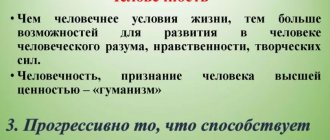09/29/2016 Category: Education and science Subcategory: Russian language Popularity
The development of society, technological progress, objects and processes in everyday life - all this is reflected in language, and specifically in the emergence of new words and phrases. It is they who will be called neologisms - which, translated from ancient Greek, means nothing more than “new word” (“neos” - new, “logos” - word).
A neologism is a word or phrase that appeared relatively recently in the language. Most often these are borrowed words from other languages. Over time, words lose their neologism status.
The specificity of neologisms lies in the fact that against the background of commonly used words they may not be understandable to everyone, they belong to the category of passive vocabulary, and at the same time they may look somewhat colorful and original. Dead languages do not have such new words, but developed languages are replenished with them not even annually, but monthly and daily. This is due to the very rapid development of progress, information technology, and the sphere of relationships, thanks to which these words appear in people’s everyday life.
Talking about what a neologism is
, it should be noted that the word will only be in this status for a certain period of time. Having lost its innovation and incomprehensibility, having become a familiar word for most people, neologism moves into the category of commonly used concepts. And new words come to replace them, and this is how the language is updated.
Classification of neologisms
The specificity of neologisms is that they may not be understandable to everyone and have limited use. Experts identify the following types of neologisms:
- general linguistic - words that are borrowed from foreign languages;
- copyright - terms invented by people, most often scientists, literary figures, and journalists.
The creation of new words is possible in different situations: friendly communication, artistic expression, child speech. Writers and poets sometimes deliberately use word creation to add expressiveness to their speech. The child does this unconsciously; he has not yet fully mastered the vocabulary. The results of such creativity are called author's neologisms.
In developed languages, the number of neologisms recorded during the year amounts to tens of thousands, which is explained by the need to name and comprehend everything new that appeared during this period. New terms refer to different types of neologisms:
- some words do not gain popularity and fall out of use;
- some words become popular, familiar and commonly used;
- There are words that remain neologisms due to insufficient popularization.
Vocabulary is the vocabulary of a language. Lexical neologisms are the creation of new terms based on models that already exist in the language: extraterrestrial, one and a half changers, counter-revolutionary, Komsomol member or borrowed from other languages - make-up, racketeer, punk, sponsor. The division of the linguistic vocabulary of a language into active and passive vocabulary is possible only in a specific historical time; each era has its own active and passive vocabulary.
Semantic neologisms are words that have received new meanings or connotations, for example, a mac is a rubberized raincoat, and now also an Apple computer. According to their purpose, new words appeared:
- to denote previously non-existent phenomena, objects and concepts: “astronaut”, “programming”, “robot”;
- as proper names for newly created things;
- to shorten and add expressiveness to a statement;
- in order to achieve artistic effect.
The Russian language has always been replenished with new expressions. One can recall the neologisms of Peter the Great’s time, words introduced by cultural figures of the 18th–19th centuries. , Lomonosov, Karamzin, modern newfangled terms that arise in connection with the development of IT technologies and robotics.
What types of neologisms exist? What are the similarities and differences between them?
Words-neologisms , as a rule, are formed from native Russian stems or borrowed using affixes in several ways:
- Prefix - non-party, counter-revolution, de-bureaucratization
- Suffixal - dealer, Komsomol member, pluralist
- Prefix-suffixal - market-style, post-perestroika, sponsored
- Build - political party, hostel
- Cutting Basics - Media, Pop Art
These neologisms in the literature on linguistics are called lexical, since they are formed according to certain models or are borrowed.
The second group of linguistic units under consideration is semantic. These are words from the active stock that receive a different meaning and move into the category of new ones. Examples of words-neologisms of this group that arose in different eras: shuttle - a merchant who purchased goods in another country and sold them at home; collapse - in relation to the national currency.
Some neologisms and their meanings have survived several changes over the century, for example, disk - in the 60-80s the name of a gramophone record, after 2000 - a computer device for recording and storing files.
The types of neologisms differ according to their stylistic coloring. Neutral ones perform only a nominative function: pulsar, bifidok, ATM, aggregator, browser. Expressive units provide an evaluative characteristic. Stylistic neologisms, examples of words and their meaning: sovok - a derogatory name for the era of the USSR, chernukha - films or books of dark content, horror films - horror films, shooters - computer games simulating wars.
Depending on the sphere of use, interstyle neologisms differ - these are examples of words used in all functional styles. They are distinguished from lexemes that are limited in use, for example: blocker, clone - scientific style; depository, microfinance organization - business; photocopy, like, register - conversational.
Origin of new words
Lomonosov brought many new words into the Russian language. He said that he was forced to look for terms to designate certain actions and things, and hoped that new names that seemed strange would become familiar over time. And so it happened. Atmosphere, oxygen, drawing, thermometer, horizon - these are now well-known scientific terms that are in use, and no one thinks about where they came from.
Another source of increasing the vocabulary of a language is the introduction of vernacular and dialect expressions into it. These include, for example, the now common words loaf, partner, earflaps and slang expressions.
In the language of specialists, there are names in which the suffix -it is added to the abbreviated name of the institute: the artificial cubic zirconia crystal was created by scientists of the Physics Institute of the Academy of Sciences; The mineral mgriite was discovered by scientists from the Department of Mineralogy of the Moscow Geological Prospecting Institute (MGRI).
Goncharov’s novel “Oblomov” introduced the concept of “Oblomovism,” which became an example and definition of laziness, stagnation and routine. Thanks to the Czech science fiction writer Capek, the word “robot” appeared. This is what he called the artificial people produced by the fictional factory. Examples of neologisms proposed by writers and poets:
- midget (D. Swift);
- nymphet (V. Nabokov);
- mediocrity (I. Severyanin);
- whopper (V. Mayakovsky);
- spiteful critic (M. Saltykov-Shchedrin);
- bungling (M. Saltykov-Shchedrin);
- klutz (A. Chekhov).
The method of forming new word combinations with the help of elements contained in the language was the main direction in the development of Russian literary vocabulary. New words obtained through stem formation are constantly appearing in our time.
Neologisms grade 5: work program for the course grade 5
With the development of scientific and technological progress and the world as a whole, new words appear that gradually come into use and, ultimately, become familiar. A person born in the 18th or 19th century would not understand much of modern speech. For example, in most cases today we say not a manager, but a manager. Words - telephone, TV, radio - also appeared relatively recently. There are words that came from other languages, as in the case of manager, and there are words formed as a result of the emergence of another social system - October, social security, executive committee. The emergence of new objects and phenomena is the reason for the emergence of neologisms. But, over time, they acquire a different status, new words become old.
Here is a short story about neologisms.
One professor began to tell children about new words using the following examples: lunar rover, printer, computer, Internet, rocket. The children were surprised, are these new words? Yes, they were once neologisms, but today they are used as usual and no one in our time would think of calling them neologisms.
Thus, we understand the relativity of the concept of novelty. It is difficult to imagine that in the Middle Ages they talked about a doctor who helped cope with toothache - a “dentist” or the school where children studied was called a “gymnasium”. When these words first began to come into use, naturally, they were neologisms, but today we won’t say that about them. Over time, the novelty of a word or phenomenon disappears and enters everyday life and colloquial speech.
Imagine the era of Peter the Great and the man from that time. In the picture below, all the words will be new to him, but do you see at least one neologism here?
why words become outdated
Neologisms become outdated over time.
One more example. You probably know what a floppy disk is, but you are unlikely to use it. After all, the word appeared when there were no memory cards or flash cards yet, which is what we use today to store information.
Let's conclude: if a word has not stood the test of time, it becomes obsolete.
The birth of the USSR. In those days, a lot of new words appeared - Komsomol member, Bolshevik, soviets (bodies of people's power), collectivization, security officer, NEPman. Today we consider these words obsolete.
what words are neologisms
If you are wondering whether a word can be classified as a neologism, ask yourself the question - does the word seem new to me? If it came into our language recently, it means we have a neologism. Well, if it is used for a long time, it is not a neologism.
Neologisms that have appeared recently cannot always be found in dictionaries. When new technologies appear, we begin to use new words - multicooker, browser, tablet, etc. The same goes for economics, business, politics, the media - fake, promoter barter, blogger, summit and words used in everyday life - bonus, cheeseburger, vegan, gamer and others.
how do neologisms appear
How do neologisms form?
- As you can see, most often, these are borrowed words from foreign languages - hacker (attacker), slogan (slogan), trend (tendency) or, for short, educational program (liquidation of illiteracy).
- Reinterpreted words can also be neologisms. The meaning of the word “tablet” is a folder for notes, but today we understand it as a type of computer that does not have a keyboard.
- Famous personalities, writers, journalists, politicians introduce new words into our language. For example, in 2021, D.A. Medvedev proposed renaming the type of coffee drink “Americano” to “Russiano”. It seems to be a joke, but a new word has appeared.
- The popular poet of the Soviet era, Mayakovsky, coined the following words: snorts, camel-ship-dragons, hulk. Such words help decorate the text, make it more expressive and bright.
- The word “robot” was coined by K. Capek, at first its translation was “to work”; in the Czech language the word “robota” means forced labor, hard labor. In 1920, he wrote the work “RUR (Rossum Universal Robots),” which describes a factory for the production of artificial people, whom the author called “robots.”
Please note that some words are original, but have entered the common vocabulary.
examples of words neologisms: neologisms of poets and writers
Thanks to poets and writers, the following words appeared:
In conclusion, we note that neologisms can appear every year, but not all of them “linger” in our speech. Today it is difficult to say whether the words “present”, “cleaning”, “reception” will remain in our everyday life, so it is necessary to remember their meaning and replace them with Russian words.
Dictionary of neologisms of the 21st century
Dictionaries of neologisms appeared from time to time. But when, at the end of the 20th century, neological dictionaries of the Russian, French and English languages, similar in nature and volume, were simultaneously created, the opportunity arose to talk about a new lexicographical specialization.
In recent decades, a large number of neologisms have appeared. Many of them have already been included in dictionaries and have become commonly used terms:
- An animator is an actor who conducts various entertainment events.
- Upgrade - updating, upgrading hardware, operating system or applications.
- Biker (eng. biker) - motorcycle driver.
- Barter (French barater) is an exchange of goods in kind, a transaction without monetary payment.
- Bonus (lat. bonus) - encouragement, bonus, advantageous offer.
- Blog (English blog) is a website, an analogue of a personal diary, which is maintained on the Internet.
- Browser (eng. web browser) is a special program for viewing web pages.
- Brand is a trademark that has a good reputation among the buyer.
- Broker is an intermediary between buyer and seller.
- Vending is the sale of goods using vending machines according to a catalog.
- Google - search for information on Google, or alternatively on the Internet.
- Deadline is the deadline by which the work must be completed.
- Distributor is a company or individual entrepreneur that purchases goods from large manufacturers for the purpose of subsequent sales in regional markets.
- Casting is the selection of models or performers from among the applicants.
- Cleaning (from English Clean) is professional cleaning.
- Copywriter is the author of advertising texts.
- Login – user account identifier in the system.
- Merchandiser is a company representative in retail chains.
- Multimedia is content that simultaneously presents information in different forms - sound, video, computer animation.
- Newsmaker is a term applied to a person who has the competence and necessary amount of information to become a source of news.
- Slogan (English) is an advertising motto that conveys an advertising message in a short form and is associated with the brand.
- Start-up is a recently created innovative company.
- Trend (eng. trend) - direction, tendency.
- Headliner - the author or hero of the headlines.
The Russian language in its present form could not exist without neologisms. New words add dynamism to the language. Vocabulary changes over time, the dictionary is replenished with new names, and outdated ones become irrelevant and remain in passive stock. New words in a language are an indicator of the development of society and culture in it. To rethink the historical development of society in a certain era, it is necessary to study the linguistic features of this time.
Examples of neologisms.
Let's give an example of a few neologism words with their meaning:
Florist
– a specialist in botany who studies plants (flora). Often applied to sellers in flower shops. In most cases, this means a person who understands flowers and works in the field of selling flowers and other plants.
Manager
- an employee of a company who manages something. Currently used too widely to be precisely defined. Initially, a manager is a manager (from the English “manage” - to manage, direct, manage).
Security
– security. The word borrowed from the English language is security, translated as protection. Borrowed as a fashion for “glamorous” job titles. This is just a security guard, not a security guard or a security manager.
Louboutins - shoes from Christian Louboutin.
Neologisms 6th grade: briefly according to the 6th grade program
how neologisms are formed
Neologisms are formed as follows:
- From foreign languages or within the state language and its types (follower - subscriber, translated from English (follow) means “following, following someone”, Westerner - a resident of Western Ukraine.
- New definitions arise for old words (mole - a remedy for pipes);
- As a result of joining one word to another (gosusluga - public service).
If new words have spread and are used everywhere, they cease to be neologisms. It would seem that recently the words “sponsor”, “terrorist attack”, “cloning” were not entirely familiar, but today they do not evoke such a feeling. Let us note that significant changes in the economy and governance of the country lead to the loss of a touch of novelty, as words become part of the everyday life of native speakers. All the changes that occur are reflected in speech, in personal and social consciousness.
types of words neologisms
Neologisms are:
Historical upheavals play a major role in the emergence of neologisms. For example, there was a surge in new words after the revolution of 1917 and after the collapse of the Soviet Union.
examples of neologism words
For example:
- The proletariat, dictatorship, commune - appeared thanks to the revolution.
- Collective farm, five-year plan, surplus appropriation system - during collectivization of the 20s - 30s of the last century.
- Medical instructor, blockade survivor, funeral service - during the Second World War.
- Pepsi, Lunokhod, jewelry - in the post-war years.
- Cooperative, voucher, glasnost - into perestroika;
- Pressing, leasing, barter - at the end of the 20th and beginning of the 21st centuries.
group neologisms
Conventionally, neologisms can be divided into three groups:
- Those that have not received distribution and, often, are heard only once. Often their authors are children, since their vocabulary is still small. For example, if you can make calls on a telephone, then it is called a SPINE.
- Words that were invented by writers, but they did not go to the people, but were preserved in their works. Example: “And who do you want to surprise with your GOOD THINGS?” (M. Saltykov-Shchedrin).
- And, finally, new words that have successfully entered into everyday use and become part of the language. You can watch a video about them below.
Every time has new words. The words: drawing, diameter, minus, square, thermometer, pump did not exist until the mid-18th century, they were invented by Mikhail Lomonosov. This famous scientist translated scientific works of foreign authors, and to make the perception of some words more understandable, he invented new ones.
Thomas More, in one of his works, described an island he invented, where an ideal society was created, without lies and deception, all people are equal, and property is common. The book is called "Utopia". In reality, such a country did not exist. This is how the word “utopia” came into use, which is a synonym for perfection, which is impossible to achieve in life.
The word “Oblomovschina” (I.S. Turgenev “Oblomov”) was borrowed from Russian classics, meaning laziness and routine.
the word Oblomovism
meaning of the word nihilism
“Nihilism” is another word introduced into use thanks to the Russian writer Turgenev. It means the denial of socially accepted ideals and values. But this word was not new for that time; they began to use it in speech after reading the novel “Fathers and Sons.”







